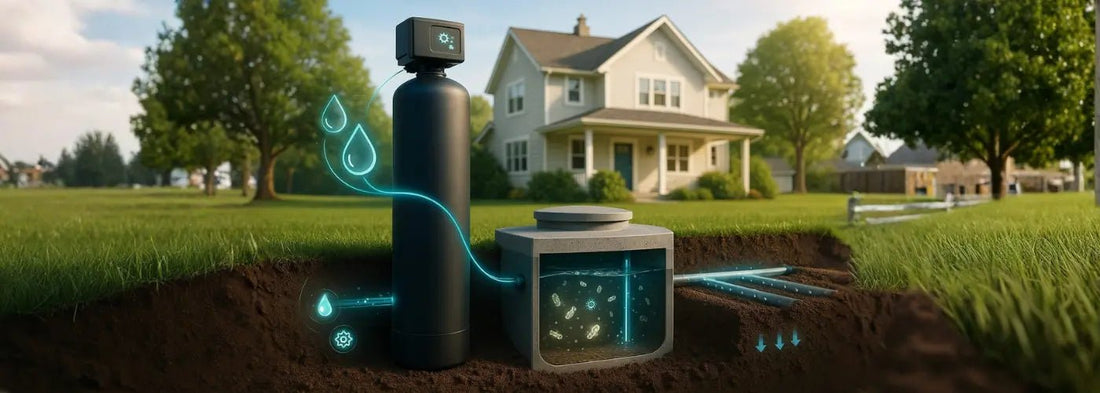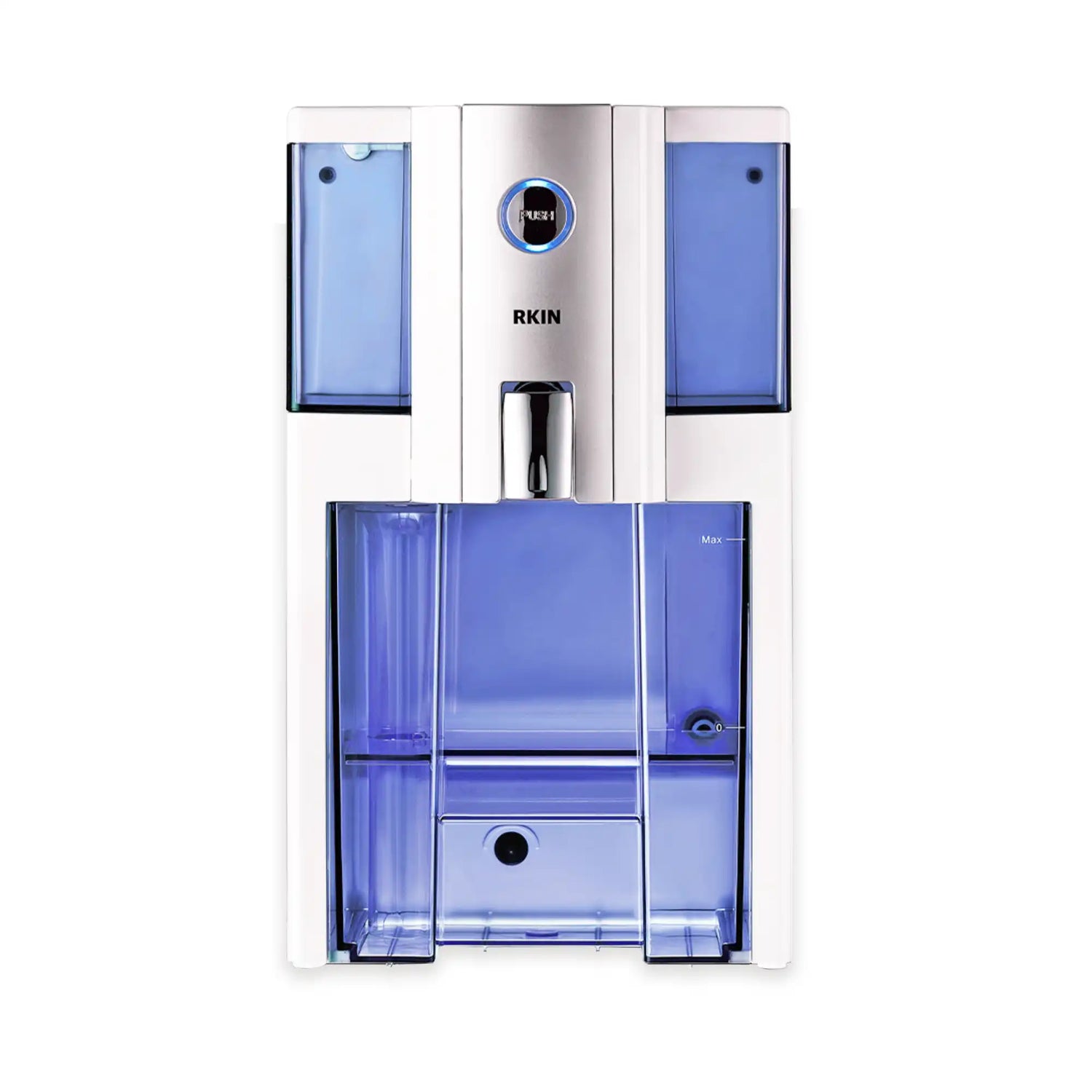
Are Water Softeners Safe for Septic Systems? A Homeowner's Guide
Share
For homeowners who rely on a septic system, every decision about what goes down the drain feels significant. You’ve invested in your home and its vital systems, and you want to ensure they all work in harmony for years to come. So, when you’re dealing with the frustrations of hard water—spotty dishes, stiff laundry, and appliance-destroying scale buildup—a major question arises: Is it safe to install a water softener?
It’s a common concern, rooted in a logical fear: will the salt brine from the softener’s regeneration cycle harm the delicate bacterial ecosystem that makes your septic system work?

For years, the answer has been clouded by conflicting advice and anecdotal evidence. But today, thanks to robust scientific research, we can answer with confidence. A modern, high-efficiency water softener is not only safe for your septic system—it can actually offer some surprising benefits.
This guide will walk you through the science, separate fact from fiction, and empower you to make the best decision for protecting your home and improving your family’s quality of life.
Understanding the Trio: Your Home's Water, Softener, and Septic System
To understand how these systems interact, it’s essential to know the role each one plays.
- Hard Water: This is simply water with a high concentration of dissolved minerals, primarily calcium and magnesium. While not a health risk, these minerals are a menace to your home. They create limescale that clogs pipes, reduces the efficiency of water heaters, and leaves a film on your skin, hair, and fixtures.
- Water Softeners: These systems solve the hard water problem through a process called ion exchange. Resin beads inside the softener tank attract and hold onto the calcium and magnesium ions, removing them from the water. When the resin is full, the system "regenerates" by flushing itself with a salt (sodium chloride) solution, which cleans off the hardness minerals and sends them, along with the excess salt, down the drain. This discharge is the source of the concern for septic owners.
- Septic Systems: Your septic system is a self-contained, underground wastewater treatment facility. The septic tank’s primary job is to hold wastewater long enough for solids to settle at the bottom (sludge) and lighter materials like grease to float to the top (scum). In the middle is a clarified liquid layer (effluent) that flows out to a drain field, where it is slowly dispersed into the soil. This entire process relies on a healthy population of naturally occurring bacteria to break down organic waste.
The Myth vs. The Science: What Really Happens in Your Septic Tank?
The central myth is that the sodium-rich discharge from a water softener will kill the beneficial bacteria in the septic tank, bringing the whole system to a grinding halt.
However, extensive research funded by the Water Quality Research Foundation (WQRF) and conducted at institutions like Virginia Polytechnic Institute and State University has debunked this myth. The studies looked at the actual concentration of sodium in septic tanks receiving softener discharge and its effect on the bacterial environment.
Here’s what they found:
- Dilution is the Solution: While the brine solution itself is highly concentrated, it’s critical to remember that it’s not the only thing going down your drain. The softener discharge is mixed with all other household wastewater—from showers, toilets, laundry, and sinks. By the time it reaches your septic tank, the salt concentration is so diluted that it has no significant negative impact on the bacteria.
- An Unexpected Benefit for Soil: The research uncovered a surprising positive effect. The calcium and magnesium ions flushed out during the regeneration process can actually improve the soil structure in your drain field. This process, known as percolation, helps the soil absorb the wastewater effluent more efficiently, which is crucial for the long-term health of your septic system.
- Improved Settling in the Tank: Further data indicated that the addition of these minerals could also lead to better settling of solids within the septic tank itself. This results in a cleaner effluent being sent to the drain field, reducing the risk of clogs and prolonging the system's life.
The scientific consensus is clear: a properly operating, modern water softener does not pose a threat to a healthy septic system.
The Key to Harmony: The Importance of Softener Efficiency
While the science is reassuring, there is one critical caveat: efficiency matters.
The research highlights a significant difference between older, inefficient water softeners and today’s high-efficiency models.
- Outdated Systems: Older models often regenerate on a fixed timer, regardless of how much water you’ve actually used. This leads to unnecessary regeneration cycles, wasting both salt and water and putting an avoidable strain on your septic system.
- Modern, High-Efficiency Systems: Today’s best systems, like those from RKIN, use Demand-Initiated Regeneration (DIR) technology. They monitor your actual water usage and only regenerate when absolutely necessary. This dramatically reduces the amount of salt and water used, ensuring peak performance and minimal impact on your septic system.
Choosing a high-efficiency system is the single most important step you can take to ensure a long, healthy relationship between your softener and your septic tank. It’s the responsible choice for protecting your investment and achieving peace of mind.
Best Practices for Septic-Safe Water Softening
Ready to solve your hard water problems without worry? By pairing a high-quality system with a few simple best practices, you can confidently enjoy the benefits of soft water.
- Choose a High-Efficiency (DIR) Model: This is non-negotiable for septic owners. It saves you money on salt and protects your system.
- Ensure Proper Sizing and Settings: Work with a water quality expert to ensure your system is sized correctly for your home’s water hardness and your family’s usage.
- Perform Regular Maintenance: Follow the manufacturer’s guidelines for keeping your softener running efficiently.
- Be Mindful of Household Cleaners: Avoid excessive use of harsh bleaches, antibacterial soaps, and caustic drain cleaners, which can harm your septic system’s bacteria independently of a softener.
- Conduct Regular Septic Inspections: Just as you would without a softener, have your septic system inspected and pumped by a professional on a regular schedule.
The Verdict: A Healthy Home Deserves Healthy Water
You don’t have to choose between protecting your septic system and protecting your home from hard water. The evidence shows that you can, and should, do both.
By choosing one of RKIN's high-efficiency whole house water softeners, you are making a smart, proactive investment in the health of your home’s plumbing, the longevity of your appliances, and the quality of your daily life. You can finally say goodbye to the damaging effects of hard water without compromising the integrity of your septic system.
Frequently Asked Questions
Will the salt from a water softener kill the good bacteria in my septic tank?
No. Scientific research shows that the salt brine is heavily diluted by other household wastewater, reaching a concentration too low to harm the essential bacteria in a properly functioning septic tank.
Do I need a special type of salt for my water softener if I have a septic system?
No special type of salt is required. Standard water softener salts (sodium chloride or potassium chloride) are perfectly safe for use with a septic system. The key is using a high-efficiency softener that minimizes total salt and water usage.
How does a high-efficiency water softener help protect my septic system?
High-efficiency, or Demand-Initiated Regeneration (DIR), systems monitor your actual water usage and only regenerate when necessary. This drastically reduces the total volume of water and the amount of salt discharged into your septic system, preventing unnecessary strain.
Can a water softener actually improve my septic system's performance?
Yes, some studies suggest it can. The calcium and magnesium ions flushed from the softener can improve soil percolation in the drain field. This helps the soil absorb wastewater more effectively, which is beneficial for the long-term health of the system.
Should I divert the water softener discharge away from my septic tank?
No, this is not necessary for a modern, efficient water softener and could even be counterproductive. The discharge contains minerals that can be beneficial to the drain field, and diverting it is an unnecessary complication and expense.
How often should I have my septic tank pumped if I use a water softener?
Your septic tank pumping schedule should not change. Follow the standard recommendation from your local health department or a septic service professional, which is typically every 3-5 years, depending on household size and tank capacity.
Are you ready to find the perfect, septic-safe water softening solution for your home? The water experts at RKIN are here to help. We are obsessed with our customers’ success and committed to providing reliable purity you can trust. Contact us today for a personalized consultation.






